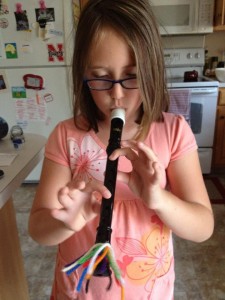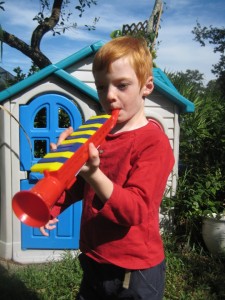 Kids and music – they just go together and our kids with hemiplegia can find many ways to enjoy playing a musical instrument. It’s extremely important for children with hemiplegia or with any disability to find an area where they can be successful and band, choir, or even playing an instrument at home can give them a sense of accomplishment and boost self esteem. Never mind that it’s just plain fun! Parents and teachers like that it teaches responsibility and helps with organizational skills, especially for students who set up a practice schedule and follow it. Playing in a band or orchestra will give students opportunities to be part of a team and a social outlet. Some of the instruments played by children with hemiplegia include recorders, piano, French horn, drums and other percussion instruments, guitar, trumpet, trombone and baritone. In this article, we’ll focus on the recorder.
Kids and music – they just go together and our kids with hemiplegia can find many ways to enjoy playing a musical instrument. It’s extremely important for children with hemiplegia or with any disability to find an area where they can be successful and band, choir, or even playing an instrument at home can give them a sense of accomplishment and boost self esteem. Never mind that it’s just plain fun! Parents and teachers like that it teaches responsibility and helps with organizational skills, especially for students who set up a practice schedule and follow it. Playing in a band or orchestra will give students opportunities to be part of a team and a social outlet. Some of the instruments played by children with hemiplegia include recorders, piano, French horn, drums and other percussion instruments, guitar, trumpet, trombone and baritone. In this article, we’ll focus on the recorder.
Jill Barber is a teacher of regular ed., special ed. and music and has taught 3rd grade recorders in general music classes for many years. Jill shares her thoughts below on the recorder music program and the recorder as an instrument for a child with hemiplegia.
The purpose of our music curriculum is to introduce children to a simple wind instrument in an effort to build basic music skills and allow opportunities for putting those skills into practice. In my school, while achievement was graded, the experience was never meant to be a source of frustration. While certain children are more “musical”, not everyone will choose to learn an instrument but recorders give most students an opportunity to feel successful on an instrument. Again the experience and purpose of the activity is to advance and practice music in a fun way.
Lots of people view recorders as toys. They are instruments and require some skill, using breath and tongue control and fine motor dexterity. Any school that has special needs programs should work with your child to provide the least restrictive and most accommodating experience at all levels, including music. Students with mild hemiplegia should be able to play recorders (at least some) as the dominant hand can be used to play the three notes (B-A-G and possibly more) that use the top holes of the recorder. It can be a challenge for any child, but most kids can be successful in learning 3-note songs. If your child has left hemiplegia and is struggling with fine motor skills, the teacher should be able to accommodate by allowing them to switch hands and having them learn fewer notes. Many third grade hands are often too small to be able to play all of the notes clearly anyway; however, many others can be very successful on the recorder. The nice thing about recorders that teachers should emphasize is individual achievement. Your child’s music class will have songs they will all be able to play together and other songs that some children will not be able to conquer. A good music teacher will be able to handle this effectively by offering more to students who can go further and by building up and encouraging others in what they have been able to learn (celebrating successes and grading for effort).
Many third grade hands are often too small to be able to play all of the notes clearly anyway; however, many others can be very successful on the recorder. The nice thing about recorders that teachers should emphasize is individual achievement. Your child’s music class will have songs they will all be able to play together and other songs that some children will not be able to conquer. A good music teacher will be able to handle this effectively by offering more to students who can go further and by building up and encouraging others in what they have been able to learn (celebrating successes and grading for effort).
At first, students may say, “This is impossible. I’ll never be able to learn this song.” But with determination, they can do it! I had one student who struggled with recorders for various reasons (including dexterity and reading) and he learned to play about 4 simple songs. For our recital he played a variety of rhythm instruments on the songs that he could not master. He was truly delighted to be accompanying the class and using his amazing skills at keeping rhythm. A good music general teacher will go out of his or her way to make music fun for everyone and should be willing to help and work with your child’s needs.
Parents from the CHASA HemiKids Discussion Group have suggested alternatives to the recorder including the pianica, also known as the melodion, which sounds like a recorder and is in the same key but is played with blowing into a tube and using a keyboard.



